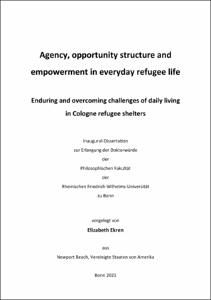Agency, opportunity structure and empowerment in everyday refugee lifeEnduring and overcoming challenges of daily living in Cologne refugee shelters

Agency, opportunity structure and empowerment in everyday refugee life
Enduring and overcoming challenges of daily living in Cologne refugee shelters

| dc.contributor.advisor | Youkhana, Eva | |
| dc.contributor.author | Ekren, Elizabeth | |
| dc.date.accessioned | 2021-11-22T14:02:14Z | |
| dc.date.available | 2021-11-22T14:02:14Z | |
| dc.date.issued | 22.11.2021 | |
| dc.identifier.uri | https://hdl.handle.net/20.500.11811/9416 | |
| dc.description.abstract | To what extent are refugees empowered in their daily lives to overcome legal, material and sociocultural challenges that governmental institutional structures create? In Germany, where over 1 million individuals have received a form of asylum-related protection since 2015, expansive possibilities for life remaking may be superficially presumed, given Germany’s robust economy and democratic political systems. As such, the purpose of this PhD research is to describe and understand refugees’ capacity for change in daily life in this unique, evolving sociopolitical context. This thesis presents qualitative data from fieldwork conducted in refugee shelters in Cologne—a large, wealthy, progressive city—between 2017 and 2018.
The conceptual approach argues that the possibilities for change are tied primarily to three key areas: 1) the assets and capabilities refugees have (agency); 2) the governmental institutional conditions that define their use (opportunity structure) and 3) the ways these factors interact to enable or constrain choices in building new lives (empowerment). A coding template, constructed deductively from these concepts and inductively from data, is used to analyze legal documents; 48 expert interviews; 28 semi-structured and conversational interviews with refugee families; and 234 pages of field note observations of shelter life. Outcomes are examined at the local level across legal, economic and sociocultural domains of daily living. Descriptive and thematic analyses reveal that refugee participants’ empowerment for change is constrained in each domain, with respect to qualities of agency and opportunity structure influencing capacity for choice. Agency as assets and capabilities is slowly expanding across domains. Participants increasingly value, strive for and gather agency in terms of understanding complex legal information, pursuing favorable legal statuses, learning German, seeking employment, establishing homes, feeling less isolated, building connections with Germans and sensing psychological peace. Legal frameworks, however, do not necessarily align to allow for its effective building or application. Although they are becoming more progressive in some ways and provide adequate levels of basic material support, access to benefits, services and rights change rapidly, creating great instability in what can be pursued as solutions. Similarly, inflexible and hierarchical governance structures limit clear entry points for participants’ dynamic engagement within. As such, participants encounter difficulties executing choices to reach the goals they value. However, whether choices break down at the level of presence, use or effectiveness varies contextually. Origin country or residency status can eliminate the presence of choice, in terms of imposing explicit legal prohibitions. Sociodemographic assets—such as gender, family status, language skills, education or professional background—threaten the use or effectiveness of choice, as individuals reconcile their former identities within new state-determined possibilities for social participation, as well as doubt the realistic possibilities to reach increasingly existential aspirations towards meaningful employment, stability and belonging. Possessing connections to engaged civil society or local government actors enhances empowerment possibilities most saliently, as such intermediaries are better positioned to navigate aforementioned agency-structure misalignments. These connections are also critical, given that refugee participants do not view shelters—still their dominant living spaces—as homes or community-based sources of help. At the same time, they nonetheless demonstrate empowerment through prioritizing family values and undertaking familiar means of homemaking, finding ways to combat turbulence with creative constructions of culturally meaningful elements of normalcy. This PhD research contributes to the evolving understanding of how governmental opportunity structures shape refugees’ broader possibilities for life remaking. Ultimately, while the consolidated analysis does not cast Germany’s refugees more broadly as victims in a state of bare life given legal structures with a humanitarian premise, more stable, multilaterally consistent policy could still limit volatility and enhance possibilities for more empowered life outcomes, as they pursue more sustainable, long-term futures. | en |
| dc.language.iso | eng | |
| dc.rights | In Copyright | |
| dc.rights.uri | http://rightsstatements.org/vocab/InC/1.0/ | |
| dc.subject | Flüchtlinge | |
| dc.subject | Flüchtlingslager | |
| dc.subject | Institutionen | |
| dc.subject | Alltagsleben | |
| dc.subject | Handlungskompetenz | |
| dc.subject | Empowerment | |
| dc.subject | Deutschland | |
| dc.subject | refugees | |
| dc.subject | refugee camps | |
| dc.subject | institutions | |
| dc.subject | daily life | |
| dc.subject | agency | |
| dc.subject | Germany | |
| dc.subject.ddc | 300 Sozialwissenschaften, Soziologie, Anthropologie | |
| dc.subject.ddc | 320 Politik | |
| dc.subject.ddc | 360 Soziale Probleme, Sozialdienste, Versicherungen | |
| dc.title | Agency, opportunity structure and empowerment in everyday refugee life | |
| dc.title.alternative | Enduring and overcoming challenges of daily living in Cologne refugee shelters | |
| dc.type | Dissertation oder Habilitation | |
| dc.publisher.name | Universitäts- und Landesbibliothek Bonn | |
| dc.publisher.location | Bonn | |
| dc.rights.accessRights | openAccess | |
| dc.identifier.urn | https://nbn-resolving.org/urn:nbn:de:hbz:5-64380 | |
| ulbbn.pubtype | Erstveröffentlichung | |
| ulbbn.birthname | Moore | |
| ulbbnediss.affiliation.name | Rheinische Friedrich-Wilhelms-Universität Bonn | |
| ulbbnediss.affiliation.location | Bonn | |
| ulbbnediss.thesis.level | Dissertation | |
| ulbbnediss.dissID | 6438 | |
| ulbbnediss.date.accepted | 28.10.2021 | |
| ulbbnediss.institute | Zentrale wissenschaftliche Einrichtungen : Zentrum für Entwicklungsforschung (ZEF) | |
| ulbbnediss.fakultaet | Philosophische Fakultät | |
| dc.contributor.coReferee | Blasius, Jörg | |
| ulbbnediss.contributor.orcid | https://orcid.org/0000-0003-1098-9281 | |
| ulbbnediss.contributor.gnd | 1247279618 |
Files in this item
This item appears in the following Collection(s)
-
E-Dissertationen (715)




